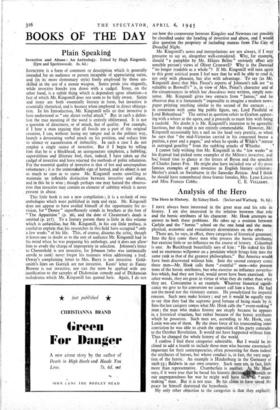BOOKS OF THE DAY
Plain Speaking
INVECTIVE is a form of comment or description which is generally intended for an audience or person incapable of appreciating satire, and (in its more elementary style) freely employed by those un- skilled in the use of a neater weapon. Satire prods you elegantly, while invective knocks you down with a cudgel. Irony, on the other hand, is a subtle thing which is dependent, upon situation—a fact of which Mr. Kingsmill does not seem to be fully aware. Satire and irony are both essentially literary in form, but invective is essentially rhetorical, and is keenest when employed in direct objurga- tion. In his Introduction, Mr. Kingsmill tells us that invective is here understood as " any direct verbal attack." But in such a defini- tion the true meaning of the word is entirely obliterated. It is not a question of directness, or of attack, but of quality. For example, if I hear a man arguing that all fossils are a part of the original creation, I can, without losing my temper and in the politest way, launch a devastating verbal attack on his position, and reduce him to silence or aeconfession of imbecility. In such a case I do not employ a single ounce of invective. But if I begin by telling him that he is a blockhead, an unregenerate simpleton, a babbling, superstitious and illiterate fool, then, indeed, I have taken up the cudgel of invective and have rejected the methods of polite refutation. For the•essential quality of invective is that of hot and unscrupulous vehemence ; it is the unmistakable sign of hatred, and its objectis not so much to cure as to curse. Mr. Kingsmill seems unwilling to maintain an inflexible distinction between invective and abuse, and in this he is wise ; though perhaps one may hazard the observa- tion that invective may contain an element of subtlety which is never present in abuse.
This little book is not a new compilation ; it is a re-hash of two anthologies which were published in. 1929 and 1930. Mr. Kingsmill does not appear to have availed himself of the opportunity for re- vision, fot "Donne-" superfluously stands in brackets at the foot of " The Apparition " (p. 36), and the date .of Chesterton's death is omitted (p. 217). To a literary person there is little in this volume which is unfamiliar, but Mr. Kingsrnill, in his cay little preface, is careful to explain that his researches in this field have occupied " only a few weeks " of his life. This, of course, disarms the critic, though it leaves one in doubt as to the sort of audience Mr. Kingsmill had in his mind when he was preparing his anthology, and it does not allow' him to evade the charge of impropriety in selection. Johnson's letter to Chesterfield is not invective, for Johnson (who was intrinsically servile to rank) never forgot his manners when addressing a lord. ()may's complaining letter to Mrs. Barry. is not invective. Gold- smith's .lines on Garrick are not invective. Keats' letter to Fanny Brawne is not invective, nor can the term be applied with any justification to the samples of Dickensian comedy and of Dickensian melodrama which Mr. Kingsmill has quoted here. Again, I do not
see how the controversy between Kingsley and Newman can possibly be classified under the heading of invective and abuse, and I would also question the • propriety of including stanzas- from The City of Dreadful Night.
Mr. Kingsmill's notes and interpolations are- not always, if I may presume to say so, altogether well-considered. Why, for example4 should " a pamphlet by Mr. Hilaire Belloc " seriously affect any sensible person's views of Oliver Cromwell? Why is the Dunciad " no longer readable as a whole "? If Mr. Kingsmill will turn again to this great satirical poem I feel sure that hewill be able to read it, not only with pleasure, but also with advantage.- TO say (as Kingsmill does) that drs. Piozzi's reports of Johnson's talk are " as. valuable as Boswell's " is, in view of Mrs. Piozzi's character and of the circumstances in which her Anecdotes were written, simply non- sense. Mr. Kingsmill gives two extracts from "Junius," " and he Observes that it is fortunately " impossible to imagine a modern news- paper printing anything similar to the second of the extracts . . . in connexion with some big public figure, say, Lord Passfield or Lord Birkenhead." The extract in question refers to Grafton appear- ing with a whore at the opera, and it proceeds to taunt him with being a cuckold. No doubt it is Mr. Kingsmill's intention to be agreeably facetious, but the result is not entirely commendable. However, Mr. Kingsmill occasionally hits a nail on the head very prettily, as when he says that " the mid-Victorian carried in his congested breast a puritan, a poet and a pagan," and when he speaks of Wilde's "retreat in outraged gentility " from the stabbing attacks of Whistler.
I cannot help wishing that Mr. Kingsmill in the " few weeks " at his disposal had picked some examples of the Milton:c invective, ana hatl found time to glance at the letters of Byron and the speeche of Charles James Fox. He might also have included one of the most
Mfmous. examples of pure invective- in English. literary criticisrnr. orley's attack on Swinburne in the Saturday Review. And I think he should have remembered those frantic females, Mrs. Lynn Linton


























 Previous page
Previous page